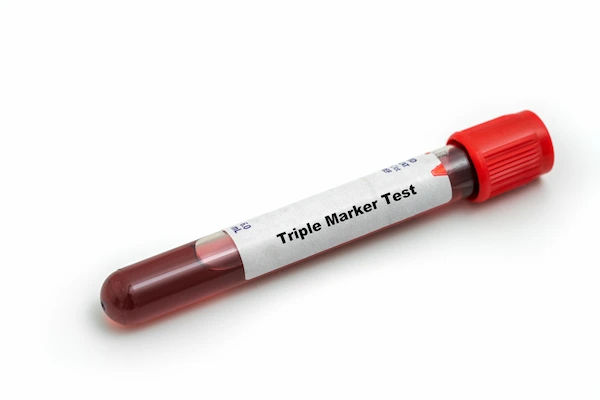Quadruple Test Normal Values Overview
Get a clear overview of normal values in the Quadruple Test, a prenatal screening used to assess the risk of certain genetic conditions in the second trimester of pregnancy.


Quadruple Test Normal Values Overview
Introduction
Pregnancy is an exciting journey, but it can also bring some anxiety, especially when it comes to medical tests. One such test is the Quadruple Test, which helps assess the risk of certain genetic conditions in your baby. If you’ve been asked to take this test, you might be wondering what it means and what the normal values are.
This guide will explain everything in simple terms—what the test is, why it’s done, what normal results look like, and what to do if your results are outside the normal range.
What Is the Quadruple Test?
The Quadruple Test (also called the Quad Screen) is a prenatal blood test usually done between 15 and 20 weeks of pregnancy. It measures four key substances in the mother’s blood:
1. Alpha-fetoprotein (AFP): A protein produced by the baby.
2. Human Chorionic Gonadotropin (hCG): A pregnancy hormone.
3. Unconjugated Estriol (uE3): A form of estrogen produced by the placenta and baby.
4. Inhibin A: A hormone that helps regulate pregnancy.
These levels, along with factors like the mother’s age, weight, and gestational age, help estimate the risk of:
- Down syndrome (Trisomy 21)
- Edward syndrome (Trisomy 18)
- Neural tube defects (like spina bifida)
Note:
This is a screening test, not a diagnostic test. It only tells you if there’s an increased risk, not a definite diagnosis.
If results show higher risk, further tests (like amniocentesis or ultrasound) may be needed.
What Are the Normal Values for the Quadruple Test?
The test results are given in Multiples of the Median (MoM)—a way to compare your levels with the average for that stage of pregnancy.
Get A Quadruple Test Here
What Do These Numbers Mean?
- MoM = 1.0: Your level is exactly average for that week.
- MoM < 1.0: Lower than average.
- MoM > 1.0: Higher than average.
Risk Assessment:
Down syndrome risk is higher if:
- hCG & Inhibin A are high
- AFP & uE3 are low
- Neural tube defect risk is higher if AFP is very high.
- Edward syndrome risk is higher if all four markers are low.
What If My Results Are Not Normal?
First, don’t panic. An abnormal result does not mean your baby definitely has a condition. It just means further testing is needed.
1. Detailed Ultrasound: Checks for physical signs of abnormalities.
2. Non-Invasive Prenatal Testing (NIPT): A blood test that analyses fetal DNA.
3. Amniocentesis: A diagnostic test where a small amount of amniotic fluid is tested (more accurate but slightly invasive).
Your doctor will guide you based on your specific results.
Consult Top Physicians Today
Tips for a Healthy Pregnancy
While the Quadruple Test helps assess risks, a healthy lifestyle supports your baby’s development:
- Eat a balanced diet: Include folic acid, iron, and calcium-rich foods.
- Take prenatal vitamins: Especially folic acid, which helps prevent neural tube defects.
- Stay active: Gentle exercises like walking or prenatal yoga help.
- Avoid alcohol & smoking: These increase pregnancy risks.
- Attend all prenatal checkups: Regular monitoring ensures early detection of any issues.
When to Consult a Doctor?
Consult your doctor if you:
- Have abnormal Quadruple Test results
- Are over 35 years old (higher risk for chromosomal conditions)
- Have a family history of genetic disorders
- Notice unusual symptoms (like reduced fetal movement)
Conclusion
The Quadruple Test is a helpful screening tool, but it’s just one part of prenatal care. Most women with abnormal results go on to have healthy babies after further testing. Stay informed, follow your doctor’s advice, and focus on taking care of yourself and your growing baby.
If you need to schedule a Quadruple Test or consult a specialist, you can easily book an appointment through Apollo 24|7 for expert care and support.
Consult Top Physicians
Consult Top Physicians

Dr. Siri Nallapu
General Practitioner
5 Years • MBBS
Hyderabad
Apollo 24|7 Clinic, Hyderabad

Dr. Shaik Abdul Kalam
General Practitioner
3 Years • MD (Physician)
Visakhapatnam
Apollo 24|7 Clinic - Andhra Pradesh, Visakhapatnam
(150+ Patients)

Dr. Jawwad Mohammed Kaleem
General Practitioner
4 Years • MBBS
Hyderabad
Apollo 24|7 Clinic, Hyderabad

Dr. Lakshmi Sanjitha Kakani
General Physician/ Internal Medicine Specialist
6 Years • MBBS, MD (General Medicine)
Visakhapatnam
Apollo 24|7 Clinic - Andhra Pradesh, Visakhapatnam

Dr. Shesham Srinidhi
General Practitioner
5 Years • MD(physician)
Hyderabad
Apollo 24|7 Clinic, Hyderabad
(150+ Patients)
Consult Top Physicians Today

Dr. Siri Nallapu
General Practitioner
5 Years • MBBS
Hyderabad
Apollo 24|7 Clinic, Hyderabad

Dr. Shaik Abdul Kalam
General Practitioner
3 Years • MD (Physician)
Visakhapatnam
Apollo 24|7 Clinic - Andhra Pradesh, Visakhapatnam
(150+ Patients)

Dr. Jawwad Mohammed Kaleem
General Practitioner
4 Years • MBBS
Hyderabad
Apollo 24|7 Clinic, Hyderabad

Dr. Lakshmi Sanjitha Kakani
General Physician/ Internal Medicine Specialist
6 Years • MBBS, MD (General Medicine)
Visakhapatnam
Apollo 24|7 Clinic - Andhra Pradesh, Visakhapatnam

Dr. Shesham Srinidhi
General Practitioner
5 Years • MD(physician)
Hyderabad
Apollo 24|7 Clinic, Hyderabad
(150+ Patients)



